#stan culture is a detriment to humanity
Note
Ok so you’re one of those weird ship purist antis ew
I? A ship purist? The gay villain apologist? The one who liked for hero x bad guy content? The one who ships worst of the worst Firelord Ozai with any man available cuz I think it’s funny? Me?? Ship purist?? With my tumblr full of years worth of BatJokes stan content???
No no, you misunderstand me, anon. Now I don’t claim to know every little thing about pro-ship/anti-ship ideology and discourse because I just don’t care. It’s yet another way for this generation on social media to try force everyone’s online and fandom experience into black and white thinking, detrimental when critical thought is worryingly scarce.
I’m neither pro nor anti as an all encompassing view point. I’m 25, y’all. I like what I like and dislike what I dislike and I’ll rant about it either way cuz I enjoy putting in my two cents. I only tag things on these platforms as either pro or anti as a courtesy to everyone else. As I said, I have no interest in being part of either.
I just tend to raise my hackles, as the majority of people do, when sick fucks like you people start trying to introduce and justify introducing children into the mix. Humans are kinda funny like that.
TL;DR: I don’t give a single fuck about pro or anti culture. I’m way too old and disinterested. I just really fucking hate pedophilia and child grooming. Can’t believe that’s a hot or loaded take but here we are.
3 notes
·
View notes
Text
Yet another John Walker rant...
I don't care how long it's been, I don't care how many times I've made this post. I'mma keep making this until everyone understands. EVERY interview with Wyatt Russell on YouTube has the same type of comments:
"You know you're a good actor when you make people HATE your character."
"The best villains are always played by the nicest actors."
"His character is such an awful person but Wyatt looks like a chill dude."
I have watched the entire series twice now to see where people are getting the idea that John Walker is a villain, that he's arrogant, cold-blooded, egotistical and childish. The way John Walker antis describe him in the show, you'd swear they were talking about the comics version.
Also, I will eat my glasses if I have to see one more person compare Walker to Homelander. You're just wrong...and annoying.
John Walker antis hate him for the exact same reason Sam and Bucky hate him. Like Sam and Bucky, antis don't pay attention to the other, smaller yet pivotal moments, the moments that give the character depth and motivation, they just see the shield in the wrong hands.
This is what Sam and Bucky sees:

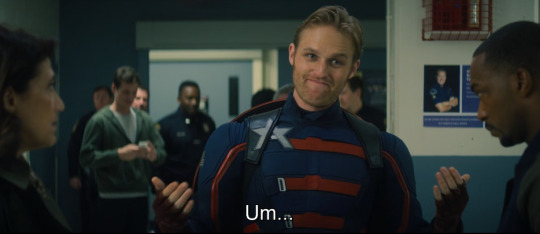
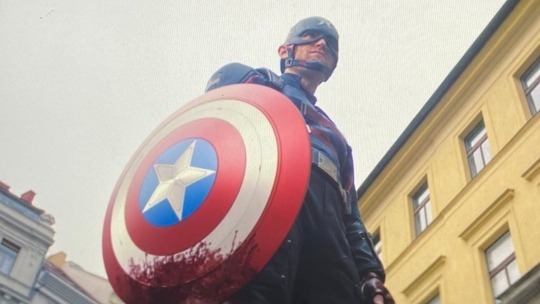
This what they don't see, and therefore what the antis will blind themselves to:

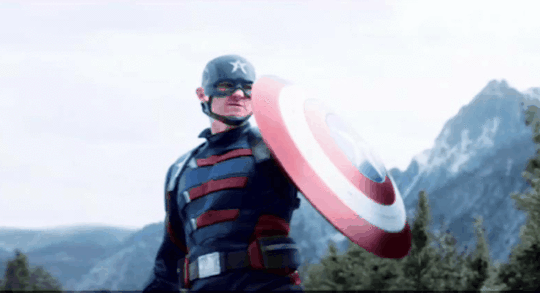
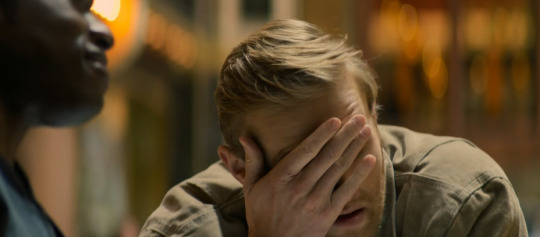
Sure, he was set up to be hated from the beginning; introducing him while the well loved protagonists, Sam and Bucky (antis), watch on disappointingly, as if they're witnessing the end of the world. This first impression will now effectively frame his obvious frustrations as arrogant and antagonistic. And the show knows this, which is why they keep piling on more shit for Walker to deal with.

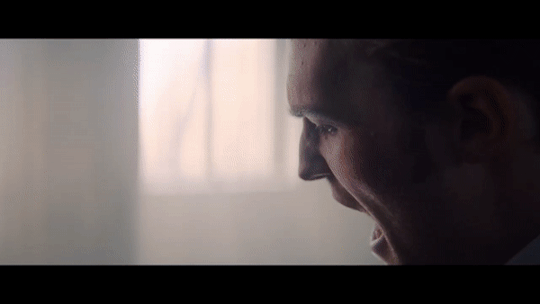
But y'all took that first impression and ran through the entire show with it. You refused to accept anything else because Sam and Bucky never once changed their minds about him. Everything he ever does is painted in the light of that first impression, which is why antis think that he's acting like a child and throwing a tantrum for the shield (despite the fact that Sam and Bucky been bitching about it since the first episode and literally beat the man for it RIGHT after he lost his best friend). No consideration towards his VERY reasonable frustrations mostly due to the lack of cooperation regarding his role as Captain America. Just like Sam and Bucky, they only see the shield.
The show always made time for Sam and Bucky's opinions, whereas we only got a few moments for John, a few moments where he isn't frustrated or doing something the audience expects, which is why Wyatt deserves his praise for giving John the extra nuance that the audience so doesn't want him to have, and to Clé Bennet as well, for portraying the short but compelling chemistry between the two of them. They were so much more interesting than the forced scenes of Sam and Bucky bickering (it was funny at times, but I didn't buy it).
John and Lemar's last conversation was a pivotal moment for their characters, and if your mind hasn't changed at this point, then, like Sam and Bucky, you refuse to see past the shield as well.

I say this as a Winter's child, Sam and Bucky are the antagonists, I don't how anyone could pick up for their actions throughout this show. It didn't even take Lemar dying for Sam and Bucky to see that John was right about working together, they just saw it as an opportunity to get that goddamn dinner plate lookin ass shield back. In the end, regarding the shield, John learned his place, Sam and Bucky learned nothing.
Folks, we are witnessing the slow and agonizing death of nuance here. Some of you really needed those English Lit. classes where they talked about the curtain being blue because the author was sad. We may be cynical about it now, but y'all missed out on some useful critical thinking and analysis skills, and it shows whenever your fave pops up on screen.
Anyway, here you go
credit to this guy for the tik tok
#tfatws#sam and bucky are the antagonists#pro john walker#pro lamar hoskins#wyatt russell#stan culture is a detriment to humanity
63 notes
·
View notes
Text
Not that anybody asked, but:
Anyone who is confused as to why they kept living together a "secret", consider this:
They both have bad experiences with doxxing. Especially Jensen. Crazies have sent rusty nails to his place for christ's sake!
The above reason is also why I, personally, tend give Jensen a pass sometimes when it comes to shippers. Shippers (namely J*2 tinhats) have stalked him, his wife and kids, his where abouts, tracked plane routes, made threats towards him his family and costars, cornered him and JP at charity events to give them (and their freaking mayor) J*2/ w🤮ncest fan art, claimed his wife is a beard (and Misha a meard to her beard for JP?) and his children are test tube babies, cornered him at cons, among a plethora of other nasty things. His experience with shippers isn't exactly the best. There are tons of positive happy little shippers, but the bad always tends to outweigh the good. Which brings me to my next point:
They know people ship them. They know. Misha has openly talked about the ship onstage as well as other cast members. They aren't entirely immune to goings on in The fandom. Out right saying it would fuel the fires and they know it. So it's eaiser for them to keep it hush hush so they don't have to deal with the uproar.
Now consider this, say there is something going on:
Image is important to actors. While being out and proud isn't necessarily a bad thing, it's still not as widely accepted in Hollywood as some would like to think. It's perfectly fine, but then you have to consider type casting. While that would be less of a problem for Misha, who's acting career is a means to an end, would it stunt Jensen's acting career as far as roles he could get.
Then there is the fact that they are both married. With kids. The mainstream media world view when it comes to poly relationships isn't exactly kind. Rumors would undoubtedly fly about affairs and such. "What about the children?!" Articles would be popping up left and right. Pop culture media thrives off of rumors and most likely would paint the whole situation in a bad light. Also, detrimental to their careers. Not to mention, that would also cast a shadow on Danneel Vicky and the children.
All of this could put serious strain on, not only their relationship, but their friendship and their families as well.
Then there's the show and it's fans to consider:
We all saw last week how insane some of the fans can be. JP stans lost their freaking minds because they learned that Jensen doesn't inform him of every single minuscule detail of his life. They were ready to slander Jensen, destroy his project before it even grew legs, and some have already sent messages to Misha's publisher about what they believe makes him an awful human. Can you imagine the panic attack of learning that Dean and Castiel's actors are living together, but not Sam's? "What about Sam? What about Jared? They're trying to exclude him! Waaaa!" They already use to freak out when Dean and Cas would have scenes together without Sam. Jen and Mish living together? They would raise absolute hell.
Jensen and JP had to(apparently still have to) keep up the " Brothers in real life and on TV" act for the brand and the GA. If Jensen would have outright told everyone that he and Misha were living together, but not Jared....it wouldn't look great. People would wonder why. Are they fighting? Are they not really friends? Blah blah blah and so forth.
If they would have openly said it 2-3...however many years ago, it could have damged the show.
These are also, likely, the reasons the In The Know part of the fandom kept quiet. Because they knew too. They knew exactly what kind of chaos it would cause. So they kept it to themselves.
So yeah, it was easier to stretch the truth about the clothes sharing and the "brief stays" and all that mess, because the truth could have very well been disastrous. Now that the show is over, however, it doesn't matter. I'm sure we can expect tons of open secrets to be revealed, maybe even some that are not so open, but also keep in mind that Jensen is still trying to keep the SPN brand going, so there might not be any groundbreaking ones coming anytime soon.
Also,also, remember they are still human beings who deserve at least a modicum of privacy. Speculation and tinhatting is all fun and games as long as it stays in a fandom space. No one should ever be forced to out themselves or tell their secrets.
Thank you. You may now resume your regularly scheduled freak out.
276 notes
·
View notes
Text
HEALTHY REMINDERS FOR STANS
This is not meant to belittle anybody for liking a content creator or a band. Nor is it meant to insinuate you are a bad person, a stupid person, or anything of the like if you were unaware of these reminders. A lot of us are young and stan culture is a recent phenomenona that is only just being understod so these things are simply gentle reminders.
Anyways here are some healthy reminders to...
1. Social Media Break: Take a break from the Internet/Phone/Computer for at least an hour a day! At the very least take a break from social media! Listen to some music, read, exercise, dance, etc. just take a break from constant updates, discourse, and other things present on social media. If you find yourself mentally and emotionally drained or stressed out every time you use social media then that is a big sign you need to limit your social media intake.
2. Content Creators Are Human: Acknowledge that content creators are normal humans like you and I so they can have lives outside of their personas and these lives should be private and respected. The golden rule of dealing with content creators is “treat them like you would a stranger you met at the mall- if you wouldn’t ask a specific question or say a specific thing to a complete stranger at the mall don’t say or ask it to a content creator”!
3. Content Creators Are Allowed To Deviate From You: These content creators are human and as such have their own seperate opinions and feelings and thoughts. Do not expect their every opinion and feeling and thought to match up with yours- as long as they aren’t directly hurting anyone they can have “the wrong opinion” about something and you shouldn’t attack them for that or demand they change their mind. You can offer education- but don’t be rude or dogpile on a content creator just because you disagree on something.
4. People Don’t Have to Like Your Favs: People are allowed to not like a content creator, their actions, or their content. This does not mean they hate you or that they hate everything about the content creator and their content- but they can simply not have a taste for it. They can critique a content creators content or their behavior. Do not attack people for criticizing your favourite content creator or their content. If your fav content creator wants to address criticism or hate they can- but you don’t need to be a white knight for them. Let content creators handle any issues or disputes on their own.
5. Don’t Rely On Them For Your Wellbeing: Please do not put all of your mental health and emotional wellbeing onto a content creator or their work. I understand that you may adore Dream or your fav Kpop Idol but please do not solely rely on then for your serotonin, happiness, drive, motivation, and general wellbeing. That is not healthy. Not for you OR for them. If you feel like you rely too much on a content creator to feel happy or feel good please seek support in other avenues such as through friends, parents, therapy, or hobbies. I understand the pandemic is a tough time but please do not put all of your emotions into the hands of a content creator or a group of them.
Anyway those are my main points! Feel free to reblog this post, crosstag it to whatever fandoms or tags you find applicable, and add on to this list! I love fandoms and all but I want everyone to avoid toxic stan culture that is detrimental to their own health and to content creators as well.
#dream smp#dreamwastaken#stan culture#kpop#stans#fandoms#fandom culture#wilbur soot#georgenotfound#karl jacobs#ranboo#dsmpblr#mcyt#dsmp#dnf#dreamnotfound#important#internet culture#icon army
307 notes
·
View notes
Note
thoughts on stan culture?
I think at the age of 22 who’s been through a TON of fandoms, stan culture can be toxic only if you allow it to be toxic. I obviously love taylor swift, I grew up with her music and she’s been there for me when it felt like no one else was. That being said I don’t think I’m the type of person to go onto someone’s Instagram account and comment snake emojis onto their page just because I believe that they’d wronged Taylor somehow. I’m able to recognize when she’s in the wrong and when she’s misstepped, because I know that she’s a real life human being and not a perfect person. I think it only becomes ‘toxic’ if you allow yourself to become so attached to said person/ thing that you blindly follow and support it no matter what. Out of context that doesn’t sound too horrible, maybe a little obsessive, but not harmful. The issue is when someone is looking at the situation with rose colored glasses on and isn’t able to truly see all sides of the situation. I think stan culture in itself can be more detrimental than good for both the fans and the celebrity. I mean, spending a lot your time attacking people and starting fights and etc etc all for the sake of your fav 1) doesn’t make your fave look good and 2) it really isn’t good for your mental health. I think that a lot of people who participate in ‘stan’ culture are probably very very young, pre teens to young adults and I also think that they’re finding escape in something that’s safe and something they can control because something in their life is missing or they’re going through a really hard time etc. I’m going to veer off track for a second here, but in Lil Nas X song ‘SUN GOES DOWN’ he kind of touches on this:
“Since ten, I've been feelin' lonely / Had friends but they was pickin' on me / Always thinkin', "Why my lips so big?" / Was I too dark? Can they sense my fears / These gay thoughts would always haunt me / I prayed God would take it from me / It's hard for you when you're fightin' / And nobody knows it when you're silent / I'd be by the phone / Stanning Nicki mornin' into dawn / Only place I felt like I belonged /Strangers make you feel so loved, you know?”
I obviously cannot relate to his fears about being a young black boy being picked on and those fears surrounding his features, I can relate to him being gay though and ‘praying away the gay’ and because of that escaping into a fandom where you bond with tens, hundreds, potentially thousands of strangers and feel loved by them. You don’t know them really, they don’t know you really. But there is a bond that can form that can be so special to people who feel like the entire world is against them. When you mix all of those things together and then add crowd mentality? It can get very messy. Celebrity expresses that they’re upset over something (like any human should be able to) > fans start talking about it > more fans start talking about it > some fans start attacking whoever it is that they feel wronged their fave > etc etc it’s a really vicious cycle. I don’t think the blame should fall on the celebs shoulders because really any person should be allowed to vent about something that they’re upset about, but I do think that they should try and be careful and mindful because they do hold a lot of people in the palms of their hands and they know it.
I guess the point I’m trying to make is that in my personal experience there is usually some other factor playing in that is making someone become so incredibly obsessed with celebrity that they can’t see all sides to a situation and blindly follow them no matter what. I’m not trying to excuse any sort of bad behavior but in my own experience it’s usually people who are needing to escape into something safe and something they can feel included in.
Regardless, that’s an explanation as to why some people can become toxic in stan culture, but not an excuse. I think the only thing that can allow people take off their rose colored glasses is either growing up or no longer needing that escapism to feel safe and loved.
Hope this very all over the place answer is what you wanted HAHA.
5 notes
·
View notes
Text
Morality-Focused Frameworks Of Discussion As Acts of Control
This is a post in response to a larger conversation I’ve been having with @eshusplayground. I have a perspective that I think would be really relevant to the conversation but I also don’t want to derail the specific focus of the following posts she’s been making recently.
(Trigger Warning For Abuse Discussion and Brief Mentions of Rape)
---
So I’m in the Hellraiser fandom. More specifically, I’m a Pinhead/Kirsty shipper.
For those of you that don’t know, Pinhead is a demonic torturer from hell who’s design is inspired by the BDSM community. Characters who open a magical puzzle box have unknowingly given themselves away to his violent underworld community of eternal torment and depravity. Hellraiser is a film about romantic and sexual horror, and there’s quite a lot in there about abuse and trauma. Kirsty is a traumatized person, and in my personal opinion, very likely a CSA victim.
And I ship these two characters together.
So the subject matter of my particular fandom is extremely intense and niche and complicated to navigate, although YMMV (I have no trouble with this franchise, but I cannot really handle GOT or American Horror Story, for example). After I grew interested in Hellraiser and integrated into it’s fandom, my perspectives about the way we have conversations about villainous characters started to have a major shift.
I often see people have these intense conversations (and arguments) about where a particular character exists on a moral scale, with the subtext (or outright text) that if they tip too far one way or another, they can be rendered unworthy of their own subgroup of fans within their own fandom. People who love those characters or find them shippable are then subject to moral judgements.
So how does one apply such logic to a psychosexual torture demon?
The answer is you can’t.
The frameworks people online use to have these discussions do not make any sense when talking about my fandom. Hellraiser is a dark horror fairytale presenting disturbing, surreal images and behaviors in order to discuss complex and difficult experiences and perspectives. The monsters within it, like Pinhead, are more metaphor than anything.
Now, my follower count is too low and my fandom is too niche for me to really be on the receiving end of a lot of the cruelty that manifests online about the moral validity of the fiction I enjoy. That said, between the anti-kink TERFS and the younger folks involved in purity culture on this site, I can imagine exactly what it would look like. You know what they would look like.
“You’re an Abuse Apologist!”
“You’re an Abuse Fetishist!”
“You’re reinforcing sexism!”
“he’s an irredeemable torturer, you’re probably okay with literal real world rape lmao uwu”
“This is bad kink representation and you’re complicit in the abuse real men do to women because you like this!”
Now, setting aside the fact that the canon lore context of Pinhead involves him having a human soul brainwashed by a monster god to become what he is, and is also in a roundabout sense “redeemed” in canon, I think most people utilizing this kind of framework would assume that I believe Pinhead can be redeemed in the way online Discourse (tm) means it, because that’s how we talk in fandom about the villains we really like.
I do not want to redeem Pinhead. I don’t think he even needs redeeming. I don’t even see value in that conversation at all. Redemption is not a concept that makes sense for what he is, or what he could become as a character. The framework of Pinhead as a Real-World-Equivalent Human Male Abuser who Cannot Be Redeemed From His Actions would inevitably dominate all conversation, regardless of the fact that it is inherently incorrect and detrimental to real, robust literary analysis of the narrative he exists within and how brilliantly it actually interacts with male on female abuse as a subject. By nature of it’s gross oversimplification and misrepresentation, It ruins the potential for greater, more nuanced and complex conversations.
And that’s the thing: my engagement with this particular story and it’s characters has a lot to do with the potential in the narrative to examine how trauma interacts with love, desire and gender politics. Hellraiser has a very unique way of exploring that kind of subject through a storytelling aesthetic that appeals to me (horror/fairytale, gothic romance, etc).
This is about to get personal, so strap the fuck in.
I am the victim of gendered abuse, in that I had an emotionally abusive step father and sexism was absolutely a factor in why that manifested the way it did. I am also a second hand victim of gendered abuse, in that my biological father was a serial stalker and rapist, and other male abusers (or just self-centered family members) caused severe emotional destabilization in my childhood. I grew up viewing adult men as unstable, selfish children. My family endured a lot, and I came to resent the men in my mother’ life for not taking on the role of protector and nurturer when she needed them most. I had discovered the great lie of traditional masculinity: in the face of real crisis, grown men were not protectors. They did not hold together the domestic space. They abused or faltered and abandoned us. This was a repeated pattern among several men in different roles. I was often left picking up all the pieces, taking on roles as a child that these men could not. I had to have strength they did not.
My experience of desire for romantic intimacy with men and men in roles of stable, nurturing authority now inherently involves a jumbled emotional soup of fear, pain, and a deep longing that comes from a place of feminine vulnerability, a desire to be taken care of instead of being the caretaker.
The narrative of Hellraiser pushes a lot of buttons for me. It speaks to my own trauma experiences in a very specific way. In an effort to further that conversation, I’m trying to create a piece of art (a fic) inspired by the deeply personal feelings this film gives me.
For me, Pinhead represents the Jungian shadow masculine, a simultaneous mix of fear and desire, the potential for suffering and pleasure, and everything in between. These experiences are inherently intertwined for me. And Kirsty’s experiences mirror many of my own.
In other words, in order for me to get out of Hellraiser what I get out of Hellraiser, Pinhead has to be exactly what he is, and everything that he is. Which includes monstrosity. Which includes the potential for change. His place in the narrative must fully, truly embody this conversation I need to have with masculinity, which inherently involves painful, scary things.
Anybody demanding that I either denounce my interest in him as morally offensive because he’s a monster in the full sense of the word (and not just the aesthetic one like what is currently trending in Monster Boyfriend fandom), or force a traditional redemption arc upon him as if he were a real life human person who must repent for his real life sins, are essentially saying that I am not allowed to engage with this work of fiction in a way that is transformative for me. And that’s very unfortunate, because honestly, I think my perspective is so much more dynamic and has so much more to offer.
This is not just about basic catharsis. This is not even a power fantasy about emotionally transforming a powerful (white) dude, or “bad boy” fantasies, both standard arguments for villain stanning that feels like it has never truly represented me or the complexity of my experiences and interests. This is a full-on conversation and act of self expression I want to have through art about the experience of fear and trauma when dealing with men as a woman who desires men.
And I don’t think a person has to be traumatized in order to want to engage with this type of fiction. I want to be clear that my experience is not a justification for my interest (I do not need to justify myself), it is an example of a perspective that gets erased by the framework of these conversations.
To me, the framework of moral validity for enjoying fictional villains and monsters and whatever you please feels incredibly stifling to the complex, dynamic ideas and analysis that I want to engage in, because I, and many people I know, are consistently pressured to structure their thoughts with this framework as the only acceptable baseline of discussion. This is so ubiquitous that when people I’ve known have tried to engage in ways that diverge from that framework, the responses they get are outright confused or direct the conversation right back to the original framework they tried to avoid. Complex conversation gets steamrolled.
Somewhere in the conversation we were all having about acknowledging and discussing abuse and oppression, and acknowledging troubling patterns in media which reinforce the normalization of abuse and opression, some people decided that there was a very serious moral discussion to be had regarding the mere act of liking things which involve dark subject matter and complex, or even monstrous characters. They now argue that there are very clear cut, simple moral frameworks for A) telling stories and B) enjoying stories, and most importantly, that this moral framework is a valid justification for the social treatment and silencing of certain people.
A framework, by the way, which I think is actually not functionally a framework, because like the toxic American fundamentalist christian groups it’s thinking is structured from, it does not account for the vastly diverse moral landscape within it’s own space. There is no objectively consistent body of knowledge anybody is working from, because morals are derived from the human experience, which is inherently subjective.
Interestingly, no where does this have more of an impact than with marginalized people, and people like me, who want to express something deeper and more meaningful in the conversation about abuse and oppression than what this framework really offers us. To be honest, The more I see this kind of conversation making the rounds, the clearer it becomes that it’s a means of control and power game playing. It’s not about morality, but about how morality can be leveraged in order to silence truly diverse and nuanced perspectives and uphold people’s sense of self-comfort. It is a means of supplanting more convenient and easily digestible understandings of these highly complex subjects that require more intensive, thoughtful engagement, especially when it gets challenging. This kind of rhetoric absolves people of making room for complex and diverse experiences, and reinforces an (at face-value) easy to follow set of moral rules of how we are all allowed to think and feel.
The implication of all of this is that if we all adhere to the One True (alleged) Moral Framework of Fandom Engagement, then we will somehow come out on the other side with all the Good People having a Great Time having Squeaky Clean Fun. And I don’t think I should have to tell you at this point how stifling and disturbing the implications of that kind of mentality really are.
Quite frankly, I think a lot of us are very tired of constantly speaking on other people’s terms.
32 notes
·
View notes
Note
pls scream about Leo a lil bit cause my love for that man is neverending and i live for you guys' blog,,, and ur comte love fuels me??? head empty except for those two pureblood clowns
HNGNGNG I hope that both you and everyone that reads my shenanigans knows how utterly understood I feel when I see anyone stan Comte, if not both of those idiot purebloods bc good lord...I live for two tired fossil men that just want DOMESTIC BLISS. Literally they have no brain cells beyond respect women and we love that for us, it’s spectacular!!
Under a cut bc I went off and is long:
That being said I’d be happy to yell abt Leo!! Where do I even begin, this man was the reason I got into Ikevamp in the first place, and I’ve read just about every single one of his events at this point. He just makes me so TENDER!!!!!! For whatever reason the first thing that came to mind was this one time he lies about being jealous and MC is lolol u a fool if you think I can’t tell when you lie to me. And he’s so fuckiNG SHOOK?????? It’s even funnier because she’s internally like [I’m not 100% sure but for a second there he almost looked mad...time to test this theory even if it’s just A GAME T H E O R Y] And he’s so fucking pikachu meme that shit sends me. I can’t handle the fact that he’s so used to people just assuming he’s fine, that he can handle himself. That he’s lived for so long without really anyone noticing at all. (Comte absolutely notices and will lightly roast him, but doesn’t really push him about it or wants to overstep). And so when MC just actively pays attention and is so gentle with him he’s just floored???
God I’m crying now, but I will just never forget the funeral scene in his fucking rt. This asshole, this absolute moron, straight up tries to come at us with “yOu GeT uSeD tO iT aFtEr HaLf A mIlLeNiUm, i’M nOt SaD”. Like are you serious. Come here and let me hold you before I throttle you. Absolute clown. He’s just always trying so hard to get by on his own and it breaks my heart. How long...how long has he lived just getting by, nursing his own wounds and dragging himself up all by himself. HE LEFT HOME AT LIKE 14 (whatever the fuCK SOME TOO YOUNG AGE) AND RAN STRAIGHT INTO THE HANDS OF PEOPLE THAT HATED HIM FOR HIS TALENT. HE REMEMBERS HIS MENTORS DESTROYING HIS UTENSILS WHILE TRYING TO ESCAPE PARENTS THAT WHOLEHEARTEDLY REJECTED ANY EXPRESSION OF LOVE OR COMPASSION FOR HUMANITY THAT HE CHERISHED SO DEEPLY. I DON’T NEED SLEEP I NEED TO HUG HIM IMMEDIATELY FUCKING HELL.
Like.........there’s just........I don’t know how to explain it, but I once saw it explained so well in a post. It was basically talking about Castlevania, and how in that show Dracula sees humanity’s folly and develops so much hatred he just goes straight to murder rage. And while in some ways I understand that, I understand even more deeply Trevor’s response to humanity’s fear and violence. He says that he knows they’re short-sighted, that maybe we all just don’t deserve saving...but that he’s going to do it anyway. Leonardo just so much gives me that energy of knowing there’s so much pain in the world, but all we can do is keep walking--keep trying, even if we have to claw our way forward. Because if you only see the awfulness in front of you, you forget the way that strangers make silly faces at babies to make them laugh on the train, how a friend will put everything down to race over to someone and comfort them with some ice cream--do anything they can to distract them from the hurt. How the sight of a child crying will prompt careful cooing from a stranger as to their bravery, an offering of cool water, the gentle placement of a bandaid. How a pair of teenagers will spot a lost child in milliseconds and help them seek out their parents protectively. There is so much wretchedness, but also so much beauty in it all, and the older I get the more I see myself wanting to believe in the latter. I want to be hopeful, and easily impressed, and full of love. To be bitter and jaded accomplishes nothing, and only becomes a worsening self-fulfilling prophecy. The more you seek negativity, the more you will find it; and worse, create it.
I also scream a little bit bc like. I’ve gone on and on about how Comte is very obviously in love with MC all the time, and sure that may be true. But...I really don’t think Leo is exempt from that either if I’m honest lmfao. Only because what does Leonardo do when it isn’t his route? He almost never shows up. Once in a while he might appear for a split second in a scene, but he almost never converses with MC beyond those short moments. While Comte is the one to pine openly, I’d wager Leo is the opposite. He pines in absolute silence, because he knows that if he gets any closer--he’s going to fall. He’s going to enjoy it too much, going to keep seeking out more before he can stop himself. And losing another person he loves...he just can’t do it anymore. In his first meeting story he talks about seeing MC’s eyes and feeling like he’d known them all his life, and even in his MS he speaks to just being completely fascinated by and enamored of her. She doesn’t hesitate, always does her best, meets people head-on and without much hesitation. After a lifetime of people that are probably just immediately interested in him for his talents, or always seeking out his company for the novelty, this is someone that doesn’t give a single fuck if he’s Leonardo da Vinci. Sure she’s aware, and sure she’s impressed to some extent, but her respect--her attraction and admiration--is something that has to be earned.
There’s something so refreshing about how their love was written. Sure it’s the whole fake marriage to a real relationship, but it’s also a kind of subtle enemies to lovers pulled off masterfully. MC is 100% minding her own business, just wants to do what she must in order to get home, tries to focus on her work to keep from thinking about how much she misses her old life. She doesn’t rely on anyone, doesn’t talk about how hard it is or how scary it is or how confusing. And even Leonardo forgets in his curiosity, is just chillin and also just trying to do the bare minimum to keep from getting too attached--figures he can admire her from a distance. And then he sees her staring at the hourglass. And suddenly, he can’t just watch her do that herself. Just wait for the hard times to pass, just sit with her own loneliness--that hollowing silence. There’s something so moving about it because he reaches out precisely because he knows that feeling to his fucking marrow, and literally just cannot watch somebody else do that to themselves. Sure he’s been dealing with it for three hundred years, BUT THIS GOOD BABIE CHILD DOES NOT DESERVE THIS. SHE WORKS HARD AND DESERVES NICE THINGS!!!!!!!! And so he drives her crazy as he races ahead of her, intercepting any attempt for her to preserve that silence and hide. She doesn’t see any pattern to it, and that’s just how he likes it--he doesn’t want her to worry about the how or why.
Like I fully remembering playing in Japanese and being like oh my fucking god this is hilarious, this man is just a wild fucker and I love this. I was enjoying myself, mostly laughing and shaking my head. But then it just gets so, so serious. I was having so much fun that I, like a fool, forgot the anime effect. If you’re having fun, it’s going to come crashing down without mercy soon enough. And it does. He helps a little girl without any hope play her violin again, and maybe I’m just too English major but I was fucking FLOORED when I realized I didn’t see that that was straight foreshadowing. That little girl without hope? That was MC (and by extension depending on how you play, us). Though the metaphor isn’t quite so easily mapped without a physical space, the connection is clear when you think about it. With his careful social awareness, he makes a place for MC to exist in the mansion so naturally--as though she was meant to be there from the start, crafts a positive impression of her presence with each of the residents. And he does it with zero expectation of anything in return; he’s just happy to see her not stressing herself out anymore or trying to do everything alone. MC doesn’t fall in love with him despite their differences, she falls in love with him because they are the same in a singular and all-encompassing way that matters; they both care about other people so deeply, to the point where they will forego any personal needs in order to make that person’s life easier. Whether it be muting their own hardship, or working to involve another person in a new space (or opening up to the point of self-destruction to keep a person from feeling alone), they go above and beyond what anybody asks of them--perhaps strong to the point of their own detriment, in some cases.
It’s why I always laugh when he says to Sebastian “That cara mia, she has a good heart.” Of course she does, Leonardo; it certainly takes one to know one.
And because I literally have no brain cells beyond being in fucking love with Leonardo THE LAKE SCENE IS AN AFFRONT TO MY DIGNITY AND SELF-CONTROL. HOW DARE YOU, SIGNORE. HOW DARE YOU ASK ME TO SIT THERE AND WATCH YOU OPEN YOUR HEART TO ME AND NOT BAWL MY EYES OUT AND TRY TO KISS YOU ALL AT THE SAME TIME. SIGNORE “hAhA yOu’Re So SmAlL yOu LoOk LiKe YoU’rE DrOwNiNg In My CoAt.” I WOULD DROWN AND DIE HAPPY--BITCH I TELL YOU THAT.
Like. I can’t think of another route I’ve ever done where I spent a good amount of time like “lmfao this guy is so wild im gonna punch him” to just be in a whirlpool of my own tears, regretting my entire fucking LIFE days later. Like Leonardo’s cultural impact???? Fucking immeasurable, I wish every white man disaster I ever met had a hidden heart of gold in all of his boyish dumbassery, an ICONIC himbo of our time.
Also because I remembered it before posting and I am Dying^TM. The event where MC was a pureblood and he was human. That entire fucking event. I literally can’t think about it without screaming and crying. Her just so flustered at his reaction to her like “oh look, free real estate” as he plops her in his lap, absolutely no fear, treating her like a princess because of her noble title despite NO NECESSITY BEYOND PLAYFULNESS BUT ALSO STILL MEANING IT IN AN EARNEST WAY, being charming to no END just to see her laugh or look away shyly.
WHEN HE SAID. WHEN HE SAID “...Can’t leave you alone, or you might go off someplace I can’t follow.” I. CONGRATULATIONS, YOU STRIPPED DEVOTION DOWN TO ITS BARE ESSENTIALS!!!!!! GAH HOW MC HERSELF SAYS “I would tell him the truth but...he’s much too generous for a human. I know he would offer his life without a moment’s hesitation.” How Leo describes the aftermath of her biting him: “Lucky for you, I’m a true gentleman, Unlike my principessa, who took me like a storm” HELLO??????? H E L L O ???????????????????????? ARE WE JUST GOING TO SLEEP ON THE FACT THAT HE LOST HIS ENTIRE SOUL WHEN SHE BIT HIM???? I--
Thank you for coming to my TED Talk.
(Also as much as I love him the cigarillos have got to go at some point, boy do you have any idea the shit secondhand smoke does good lordt)
#asks#ikevamp#ikemen vampire#ikevamp leonardo#ikevamp comte#can you feel me going through 800 different emotions in the course of writing this#fucking hell#he absolutely kills me i love him so much#would do ANYTHING for him#if you listen v closely you can hear the soft sound of me grabbing tissues#god i was just rewatching some of his events and i just#THE SHEER WARMTH OF HIS PRESENCE HOW IT WASHES OVER YOU WHILE READING#IM SHAKING AND CRYING I LOVE HIM SO MUCH#SO MUCH!!!!!!!!!!!!!!!!!!!#like leo is just one of those routes where its like 'my life was before and after this moment'#otome is honestly destroying my standards OTL#he just makes me feel So Much my coherence disappears#brain cells???? don't know her only Leo tiddy#in conclusion: AAAAAAAAAAAAAAAAAAAAAAAA
211 notes
·
View notes
Note
hi kat 🤧☹️ you’re always so calm and supportive in times like this. i really see your as an older sister on tumblr sometimes even tho i’m too shy to directly message you. but with everything happening with chanyeol i don’t really know where to go. i’m starting to believe some of it is true simply because not saying yes doesn’t mean you’re saying no either. and everything with raiden and now baekhyun is confusing. it’s really hard to be online now and i’m getting stressed. i just wanted to 1/2
know how you felt about everything or get your perspective. if you can’t answer i’m really sorry for bothering you with it. i’m sure you have lots of messages about this because you’re one of his biggest fans. but you’re so calming and even if you tell me it will be ok i’ll believe it because you’re so wise. i’m rambling now i’m sorry 😔🥺 anyway i’m really looking forward to chanvember. don’t overwork yourself too much. i can’t wait to see what’s in store 💚💚
hi anon. this is really sweet! i appreciate that you see me as this sort of...bog witch mountain creature who brings comfort through my fics or something lmaoo that really makes me smile. its ok to be shy. if this is comfortable for you then anon asks are always welcome. i understand you tho. it is hard to go through any kind of issue like this. expectations and reality very often dont align and when you respect a person, and love them in some way, seeing the collective shift in this way is difficult. more than anything else id like to advise you that - the collective opinion does not have to be yours, and more than that, he is human. everyone is human and not a single person, idol or otherwise is free of flaws or darkness. some people have darkness that is deeper than others, and that is their responsibility to work through it. whether or not you decide to continue to stan, believe his innocence, or his guilt is up to you, and is your business. the same way his personal life is his business.
so more than anything hold onto that. the collective opinion has no power over you. and i know its hard to persist in your own opinion. it takes courage. but maybe thats a lesson for everyone, too.
as for me. i rely on facts. facts of what my own eyes saw, facts of connection, and facts of what i know about the way the music industry works. with social media and technology being what it is, theres a culture of immediacy around things which brings about impatience. and in a lot of cases, yeah, its important to react quickly. but its not ok to react quickly if responding with haste is to a detriment of your case. in my eyes there is a reason things are happening the way they are, and it has nothing to do with guilt. i was raised on the belief a person is innocent until proven guilty, and i hold to that value.
legally, it is more than probable he cannot make a statement until documents, timelines, and files are compiled. its reckless to do so without those. i also know that SMs half hearted statement likely came down to the burden of unsigned contracts - this is not just in chanyeols case. its in all of their cases. beyond sm, chanyeol has brand partnerships to maintain. theres 3 active campaigns, and i can almost assure you the ink is not yet dry on something else hes trying to establish. on top of other connections to make in order to promote his studio as a production company. its a hustle. its a PR team and a legal team implicated - but its not just his. its baekhyuns, for his name being brought in. its the studio’s because its not just a studio for chanyeol’s work - they just did the exhibition for jean basquiat which is happening right now. its a lot of contracts and lawyers doing damage control, and pushing someone for a yes or no before his legal team even can give an all clear is, again, reckless.
my belief of his innocence is my opinion. the fact that there are legally binding ways in which the music and art industry works is facts. my recommendation is to consider what you know to be factual and arrive at your own conclusion. i hope this helps
#this is the first and last time im answering anything about this#not because im trying to silence people#but because i think theres nothing else anyone could possible add#wait for his statement#wait for legal teams to come to a conclusion#you cant say youre suing a party for defamation if you dont even know who the party is#Anonymous
12 notes
·
View notes
Text
EPISODE 11 BONUS ROUND: K-POP
What groups do you stan?
NCT, BTS, Seventeen, SKZ, EXO
Who are your biases?
Haechan (ult), Jeno, Jimin, S.coups, Hyunjin, Baekhyun
If you could do one activity with your ult, what would it be?
Take him out for food.. or he takes me out i hear he knows a lot of good places!
Why do you think people love idols and their stories so much?
The entertainment material they put out to the public for consuming is full of different ideas, artistic styles and aesthetic choices for people to appreciate. visuals and performance aspects are a highly important factor in the industry and it makes sense that people favour these public figures and invest time and money into supporting them, and that’s how the industry works. The reason why I think people are drawn to these idols is because they provide a means by which we can escape our reality and smile at them, laugh with them, cry with them and ultimately feel something. Their music can lift our spirits even when we’re down in the dumps, or we can relate to their sadder songs and express our emotions through listening to music. We commit to following and supporting these groups because we feel something. The stories about them allow us to imagine a world in which that relationship was personal, perhaps look into another universe in which they could have met, have loved, have died together, and so on.
Where do you think the line between fantasy and reality should be drawn?
I know it is concerning if people cannot distinguish from their fantasies and reality. Integrating these fantasies with their thought patterns in real life can have detrimental consequences and we’ve seen that through the actions of sasaengs. That being said, I can’t blame people who say, “I want to marry them!” because yes! I have also said that too. I’ve lamented with my friends about how my standards have shot up because of kpop and the people I see on screen. But I understand that there is only, even if there was, a miniscule chance that that could possibly happen in this lifetime, given our respective situations and settings. In my opinion, the line should be drawn where people say “I want to marry you!” and instead, a better thing to say would be “I want to marry someone like you!” I’m sure idols themselves have mixed feelings about when fans say how much they want to date them, and how much they want to marry them, etc. and I’m sure a good portion of them would feel uncomfortable about it and some even say it upright: “no”. We have to understand that they’re human too, and even if we didn’t exist in their life, they would still be able to live on without us. Going against their own choices (especially romantic ones) seems hardly supportive of them as people. Nothing creeps me out more than when fans act like they own their faves and I can’t see whether or not they’re joking.
What would you do if you met your bias in real life?
If I met Haechan, I’d tell him that i envy his life performing onstage and the way he’s able to bring so many people joy and happy memories, and that me having the pleasure of sharing my youth with his presence is enough for me. I’d thank him for doing what he does. That I hope his own sacrifices paid off and he realises the rewarding aspects of his job. That his relationships with his members are so nice to see, that he’s amazing at what he does and no matter what choice he makes, there will always be people behind him, ready to support. I’d tell him that I’ve heard from my friends that he reminds them of me, laugh about how my sister called me the female version of Haechan. I might make a joke that I must have committed a terrible crime in my past life to have been condemned to admiring him from afar. I’d ask for a hug, because he always looks ready to give someone a good hug.
Is there a need for reform in the industry?
Yes, definitely. lots of problems arise with the idols’ health and the extents to which fans can overstep the line between what’s acceptable and what’s absolutely outrageous. Stereotypes need to be erased, viewpoints need to change, prejudices against people need to be proved wrong, double-standards need to be addressed and corrected and health needs to be the focus in many, many cases, both mental and physical. The systems in place need to be reevaluated with these in mind and people need to realise that the material they consume is for entertainment, not necessarily an extension of their own social life.
If you could be a K-pop star, would you?
I’m aware that not everything there is meets the eye. Companies can screw you over, fellow trainees can screw you over, your own bandmates can screw you over, fans can turn the other way in a heartbeat and you could lose everything — but for me, the stage and the arts are what I live for. There is nothing like being able to perform and represent my country and the messages I want to deliver to anyone listening. And kpop in this sense, I think is an effective medium to do that. Especially since kpop is becoming a worldwide phenomenon, a global audience would be an amazing opportunity to share my expressions of art and music. So yes, given that I receive the opportunity and take part in the production and creative choices to an extent, that’d be my dream.
What would you do if you found out that [insert idol here] had read [this] fic about them?
Honestly, if they read any of my works, I’d probably laugh. That’s probably it. depends whether they liked it or not, if they agreed that that’s what they’d do in that situation. If they ask me why I think they’d do that, I’d tell them that it’s the human instinct. I could picture it in my head. Ask them if it made them feel anything. Maybe jokingly ask them if they’d like to act it out in a film I direct.
Why did you choose to write for a real person vs. a fictional one?
I think I’ve answered this a little in my previous answers, but in a nutshell, I write about these people because they’ve given us enough content to allow me to guess what their reactions would be in a certain setting. I try my best to keep their personalities consistent but also to get inspiration for new dialogue and actions that someone might do given that they were born into that particular universe.
Has K-Pop changed your life in any major way?
Yes, in a sense that I’ve been introduced to a world of new music and fresh concepts and the underlying social/cultural implications of my own culture and people; but I also believe that it was inevitable for me personally, as a Korean living in a time like this, in which I find national pride in our culture which includes modern music and sources of entertainment as well as traditional instruments and art forms. But yes, being exposed to the industry made me realise how much I love performing, and that I pride my creativity above most.
9 notes
·
View notes
Note
tbh i wish we would introduce accountability culture but the person in question has to actually be genuine and own up to their mistakes
okay see, here’s the thing. we would all love for celebrities who have made a mistake to get the appropriate level of backlash for what they have done, but that’s not how it works and that’s never gonna be how it works.
cancel culture started out as “accountability culture”. the whole point was to hold people accountable for their actions. but what we didn’t factor in was that being able to hide behind a screen gave a lot of people a dangerous sense of confidence. and no matter how much we whine and complain about cancel culture, that is the way it is always going to work. there is always going to be people who take things too far and send death threats and other horrible things to celebrities that don’t deserve it, because everything has its pros and cons and that is the consequence of being a public figure. and yes, it’s horrible but what’s our other option? not holding them accountable? forgetting the slurs they’ve said or the shitty things they’ve done? that’s not a viable option either.
in my opinion, the thing far, FAR more dangerous than cancel culture is stan culture. and i literally have a celebrity blog on tumblr dot com so i know i’m not one to talk, but i don’t mean being a fan of someone. the dangerous kind of stans are the one that are so blinded by their love for their idol that they flat-out refuse to believe that said idol is actually a human being with flaws. not only does this reduce the accountability of someone who has the option to hide behind massive piles of cash, it is also detrimental for the actual celebrity themselves if their fans treat them like a robot that has to constantly be spurning out content.
TLDR: all we can do is look at how we react to things and make sure that those reactions are appropriate. celebrities are human beings, not dolls, and need to be recognized as such. they need to be held accountable for their actions, because at the end of the day, their words can have an impact on millions of impressionable people and as public figures, they need to take responsibility for that.
2 notes
·
View notes
Text
BLOGTOBER 10/23 & 10/25/2018: HALLOWEEN (2007) & HALLOWEEN II (2009)
By the time Rob Zombie made the bold move of remaking John Carpenter’s name-making classic HALLOWEEN, the horror rock-star’s directorial career had already proved to be incredibly divisive. His 2003 film debut, HOUSE OF 1,000 CORPSES drew a cult from among diehard fans of his music, but was largely panned by critics who identified it as a ramshackle, self-indulgent disaster. The movie was little more than a Frankensteining-together of Zombie’s favorite things, but he managed to follow it up swiftly with 2005′s semi-sequel, THE DEVIL’S REJECTS. With this project, he appropriated three of the principle characters from his cartoony, ROCKY HORROR PICTURE SHOW-like first feature, and reimagined them as the redneck antiheroes of a story that plays like a cross between THE TEXAS CHAIN SAW MASSACRE and THE WILD BUNCH. While DEVIL’S REJECTS showed major improvements in terms of drive and focus, it still felt unsettled. It is an emotionally confused movie that has trouble deciding whether its tale is more tragic for the innocent victims of its psychopathic protagonists, or more triumphant, for the Rejects’ anti-establishment swagger and charisma. Rob Zombie displays a refined aesthetic sense, and seems sincere in his storytelling, but he didn’t have much time to let these things ferment into a more potent cinematic brew before he stepped up to bat again with his controversial remake of the beloved HALLOWEEN in 2007.
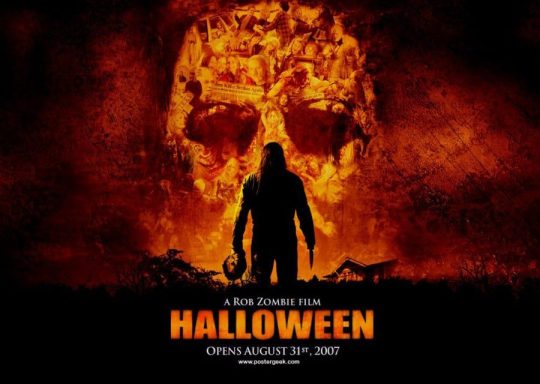
Reviled even by the likes of John Carpenter himself, Zombie’s dour, ponderous retelling of the archetypal slasher story was baffling to critics and genre buffs alike. Loaded up with clunky psychoanalysis that flies in the face of Carpenter’s original intention--Michael Myers is PURE NO-REASON EVIL, FULL STOP--this iteration of HALLOWEEN worked for few people besides Zombie’s hardcore stans. In spite of that very large and general problem, the writer-director was back again in 2009 with a sequel to his own remake. With HALLOWEEN II, he took two major creative risks: Bringing the ubiquitous Sheri Moon Zombie back even though her character died early in the first film, and centering the narrative on Laurie Strode’s psychological recovery, or lack thereof, from her original ordeal. It is easy to see how this setup would draw more complex and ambivalent responses. Mrs. Zombie’s appearance as the ghost of Myers’ mother, whose character is plagued by a lot of Jungian nonsense, was identified fairly as ludicrous by many viewers. On the other hand, Scout Taylor-Compton’s return as Laurie Strode takes a character who was little more than a cardboard cutout in the first film, and turns her into a convincing mass of trauma who undergoes a profound transformation over the course of this sequel. As with THE DEVIL’S REJECTS, HALLOWEEN II suggests that even while Rob Zombie can be an incredibly frustrating filmmaker, he still seems to be on to something. Even in my most stuck-up moments, when his smug use of slow motion and arias of unshocking cuss words make me want to forget everything I just watched, his movies nag at me in a way that I have a hard time describing. I’m just now starting to formulate an understanding of why.
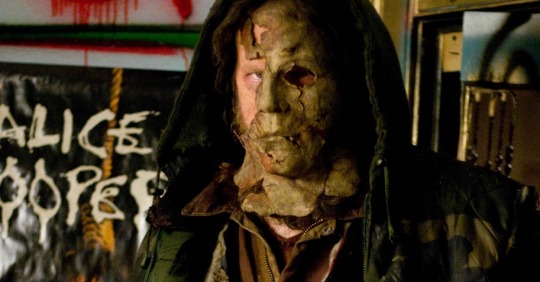
Often, I find myself asking: Who is Rob Zombie? First and foremost, he is a professional nerd. His music, art, videos, and feature films are strung together by his scholarship in all things genre, whether he’s invoking Tobe Hooper’s snuff-like realism, or the innocent sitcom pleasures of the Munsters. Zombie is vastly erudite about horror, and really anything remotely culty. This is actually to the detriment of HOUSE OF 1,000 CORPSES, which is so bloated with pop culture references that it almost chokes out the movie’s dubious originality. But while he has that irritating nerdy compulsion to competitively show off what he knows, he doesn’t seem like the kind of guy who buys and bags comics without even cracking them open. Rob Zombie is clearly, legitimately passionate; it’s heartwarming, and enough to make you want to root for him even when you don’t totally love what he’s doing. His craftsmanship is on point, too, as a multimedia artist whose talent has been abundantly evident since the early band flyer days. It comes as no surprise that he attended Parsons School of Design, and he occasionally shows his hand as an amateur film historian with a love for golden age Hollywood. So, whatever he wants you to think about his hellbilly stage presence, he’s clearly no hick, and no basement-dwelling dweeb either. He’s an educated artist with a background in New York City’s brainy ‘80s noise rock scene. It’s because of this that I find the worshipful attitude his films take toward their sociopathic murderers to be, well...kind of annoying. Why am I supposed to think it’s so cool, as the movies’ punk rock tone suggests, that the Firefly family tortures random bystanders to death for no apparent reason? Why doesn’t Rob Zombie know how tired the whole “scary clown” thing is, and has been for a long time already, even when it’s someone as magical as Sid Haig under the greasepaint? Why do I feel like Zombie’s interest in pimps and ho’s is deeper than just exploitation pastiche, which makes it potentially worse than if it were just a shallow affectation? The thought of this Massachusetts-born college boy fantasizing obsessively about being so crude and violent and salt-of-the-earth is kind of lame. So, instead of just, you know, being a hater as usual, I looked it up--and discovered that Rob Zombie’s roots are actually in the fairway. As Wikipedia aggregates from various interviews:
While raising their sons, Rob's parents worked in a carnival, but they chose to leave after a riot broke out and tents were set on fire. Zombie recalled the experience in an interview, stating, "Everybody's pulling out guns, and you could hear guns going off. I remember this one guy we knew, he was telling us where to go, and some guy just ran up to him and hit him in the face with a hammer – just busted his face wide open. My parents packed up real quick, and we took off."
Suddenly, it all started to make sense. Sure, the costumed popstar isn’t an undead cross between Jerry Lee Lewis and Charles Starkweather in real life, but he isn’t a complete poseur either. It isn’t immediately clear, from underneath his mountain of collectory movie references, that he is, more or less, writing what he knows. He isn’t just emulating his cultural heroes, he’s mythologizing his own childhood.
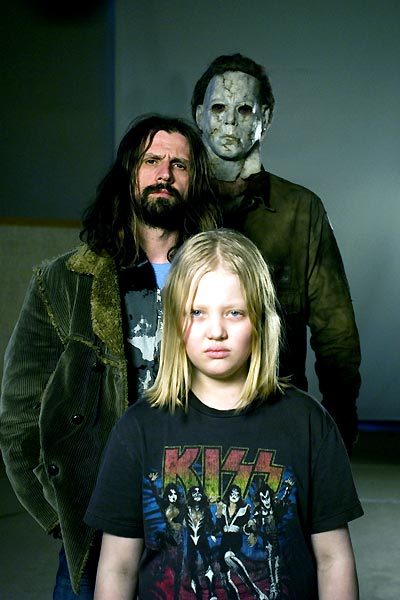
In view of this, the key to Rob Zombie’s movies is not an awareness of horror history and semiology; it’s actually all about outlaw culture. So, back to 2007′s deeply flawed HALLOWEEN. It’s a heavily bro-y movie, in its outsidery way, that breaks up the Dr. Loomis-Michael Myers-Laurie Strode love triangle, and focuses almost entirely on building a Myers biography. The fascinatingly sullen Daeg Neergaard Faerch plays young Michael, a fatherless boy on the verge of snapping from the relentless torment coming at him from all directions: his slutty sister, school bullies who fixate on his stripper mom (Sheri Moon Zombie), and his mother’s latest violent, depraved boyfriend. Michael follows the serial killer script perfectly, graduating rapidly from torturing animals to brutalizing other kids to annihilating his sister, her boyfriend, and his mother’s beau one Halloween night when his sibling chooses sex over taking her little brother trick-or-treating. He soon finds himself installed in a mental institution where he moves on to slaughtering the staff. Dr. Loomis (Malcolm McDowell) spends years evaluating the boy, though he is ultimately stymied by Michael’s profound lack of humanity. As Michael increasingly retreats behind the folksy homemade masks he spends all day crafting, the opportunistic Loomis gives up on him, instead committing his energy to a money-making true crime/pop psychology book about Myers. Flashing forward, we find the hulking adult Michael Myers (played by the 6′8″ wrestler Tyler Mane) getting ready to bust out of the asylum and wage war on his home town of Haddonfield. There we finally meet teen dream Laurie Strode, a spunky babysitter with a gaggle of gal pals who are perfect grist for the slasher mill. In the final leg of the film, Myers carves his way through Laurie’s social circle, in an apparent attempt to reunite with his sister: Laurie herself. Sheriff Brackett (Brad Dourif) reveals that when Michael’s despairing mother committed suicide years ago, he took her infant daughter and had her adopted out anonymously to insulate her from her family’s tragic history. Laurie, for her part, is unaware of anything other than her need to survive, which she only barely accomplishes.
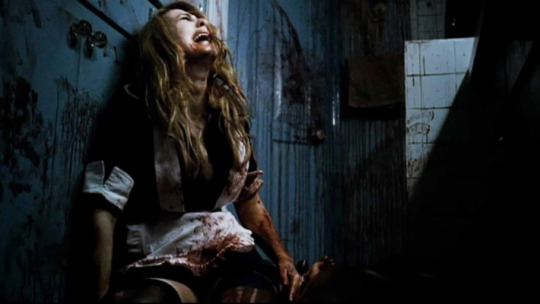
Naturally, Laurie’s story is the weakest part of a movie that is otherwise so focused on male experience. That is, the experience of needing a father, the ambivalent and ambiguous craving for maternal intimacy, the trauma of having your masculinity impugned by your (fag-obsessed) peers, and perhaps even the undermining influence of academia and capitalism on a man’s natural-born strength and worth. When the newly-freed Michael Myers storms through a truck stop to begin his pilgrimage to Haddonfield, and Rob Zombie chooses to accompany this scene with Rush’s regal outlaw anthem “Tom Sawyer”, it tells you everything you need to know about this take on HALLOWEEN. Like the rampaging Firefly family in DEVIL’S REJECTS, Michael is certainly evil, but he also represents something essential about the formation of and reinforcement of one’s individuality in the face of castrating societal norms--something the carnies among whom Rob Zombie grew up would have found very relatable.
It’s worth noting here that, while the sexuality of the women in Michael’s life plays a role in his distorted development, he is not reacting to their sexuality in and of itself. Michael Myers is not driven by the kind of covetousness that we associate with the archetypal slasher, who gives sexually frustrated male viewers a vicarious thrill by punishing sluts and teases. Michael’s problem is that his mother and sister’s sexuality contributes to his isolation. His classmates use his mother’s profession against him, and that profession keeps her from being able to tuck him in at night. Similarly, Michael doesn’t get to enjoy Halloween with his family and the other neighborhood kids, because his sister is too busy getting laid. Michael is abandoned, even while he still has a home to return to, an outsider even in his own house.
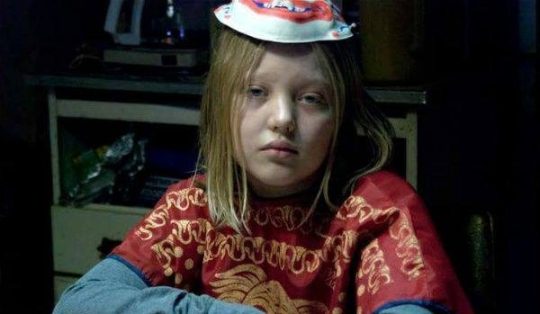
This leads me to an important point about why the portion of the movie that is devoted to Laurie's struggle is so ineffective. It is a flaw in the film, but a virtue of the director: Normal, attractive teenagers are not Rob Zombie’s people. He doesn’t even participate in traditional slasher movie misogyny, he’s so far away from thinking about them. His movies are full of badass women who are fully possessed of their sexuality, and who wield it like a weapon against hypocrites and assholes, and this is always shone in a heroic light. Moreover, he delights in casting women of all shapes and ages, often assigning them immense personal power, as in LORDS OF SALEM, an enormously satisfying movie about society’s original persecuted outcasts: witches. Rob Zombie is deeply committed to outsiders, and his definition of them isn’t limited to banal lawbreaking--he also rejects conventional beauty and our cultural obsession with youth. His films are populated by all manner of human beings, and the farther away they are from looking like model material, the more likely it is that they’re meant to be the heroes. On that note, whatever you think of his movies, you have to acknowledge that they are almost never dehumanizing. Zombie is an accomplished actor’s director who gets a full spectrum of emotion out of his performers, and who excels at creating a feeling of camaraderie within his ensemble casts. It is this surprising sweetness, and compassion even for the victims of the villains he lionizes, that makes HALLOWEEN II so peculiarly effective.
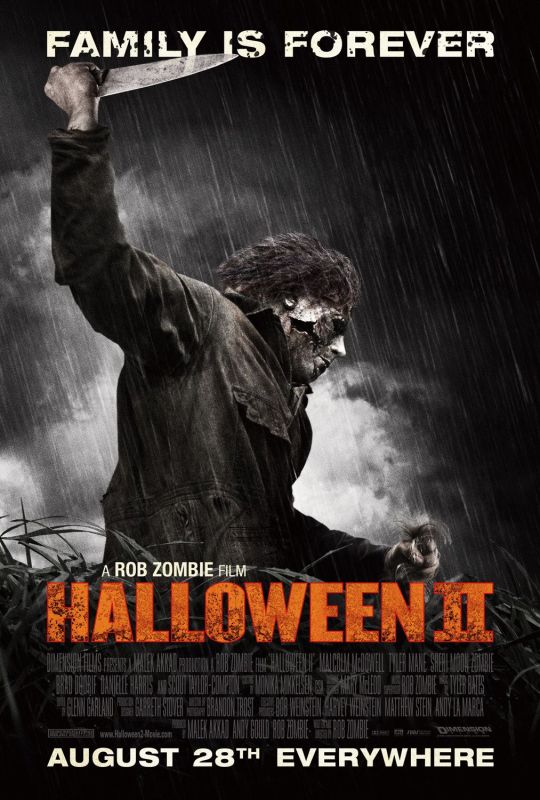
If 2007′s HALLOWEEN was a remake on which Rob Zombie couldn’t resist draping some of his personal hangups, HALLOWEEN II is almost a completely original and separate entity from what one thinks of as the franchise started by John Carpenter. In it, Michael Myers is presumed dead but his body is missing--and indeed, his character is missing for much of the movie. We find a disturbed, scarred-up Laurie Strode living with her surviving friend Annie, and Annie’s father, Sheriff Bracket. Laurie is dealing, poorly, with a heavy dose of PTSD. Along with nightmares and flashbacks, she also has trouble just being nice to people, or accepting affection. Annie and her father’s attempts to be charitable with their adoptive family member are no match for Laurie’s increasing surliness and mistrust of the world. Once a good-natured and optimistic young woman, her appearance becomes vagrant-like (curiously similar to Rob Zombie’s own casual look), her attitude is more and more nihilistic, and she develops a drinking problem. I’ve always wanted to see a movie with a slasher-like narrative foundation, but that focuses on aftermath and recovery, and recent gimmicky efforts like FINAL GIRL and LAST GIRL STANDING did absolutely nothing for me. HALLOWEEN II--at least, the superbly-acted Strode part of it--is the movie I’ve been asking for.
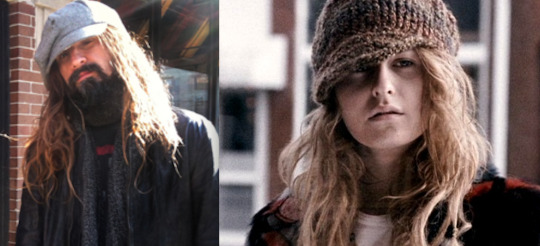
The other part of the movie is also interesting--or more specifically, it’s as ballsy as it is flawed. The movie gets off on kind of a bad foot when a title card quotes an obscure psychology text book called The Subconscious Psychosis of Dreams:
WHITE HORSE - instinct, purity, and the drive of the physical body to release powerful and emotional forces, like rage with ensuing chaos and destruction.
This is the excuse we have for the fact that the ghost of Deborah Myers arrives with a white horse to compel her son to find his sister Laurie Strode, aka Angel Myers, to reunite their family, presumably in the afterlife. Deborah Myers is kind of a spectral cross between Glenda the Good Witch and the Wicked Witch of the West, at once welcoming and sinister, drifting in and out of Michael’s consciousness in the company of a sort of ghost of his childhood (Chase White Vaneck, who is no Daeg Faerch honestly). It might be easy to dismiss this anomaly as an expression of Michael’s mental illness, and his desire to experience an idealized version of his youth in which his mother still looks after him--except that later in the movie, during the final standoff, Laurie is shown to be physically affected by these spirits. Maybe the implication is that she and Michael suffer the same psychological ailments, but for them to share such specific hallucinations without speaking is borderline supernatural in and of itself. So, while Sheri Moon Zombie does her best with her impressive force of personality and compelling physical presence, it’s hard to say what this part of the movie serves. When I first saw the film, I was completely outraged by this, not only because it made no sense to me, but because it felt like a cheap ripoff of Sarah Palmer’s similar prophetic visions of a white horse in Twin Peaks. That was all I managed to make of it.
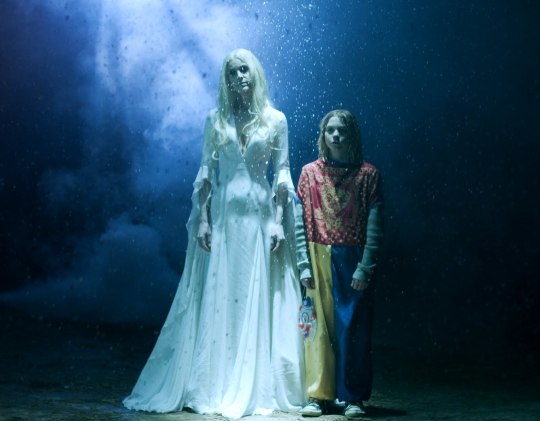
Today, I still don’t love it, but I have more trouble faulting Rob Zombie for trying to make HALLOWEEN his own, something more than a remake. He also does this by truly letting go of the Shape. The famous William Shatner mask was blown in half by Laurie at the end of the 2007 HALLOWEEN, and scarcely makes much of an appearance in this movie. Michael Myers is a disheveled drifter, literally haunted by his past, whose only real aim is to find a place to belong. It’s sort of funny, in retrospect: When John Carpenter made the first HALLOWEEN, he-by-way-of-Dr. Loomis declared Michael an empty shell of a person, someone who was simply born evil, as reflected by the empty-eyed mask he wears. For some reason, though, a whole legacy of directors just couldn’t resist trying to explain Myers away. The original HALLOWEEN II then says, “Well...what if Michael Myers is on a rampage because LAURIE STRODE IS HIS SISTER? What’s that you say? Why is that a reason to rampage? Ummmm...” And then HALLOWEEN 4 sees him pursuing other young female relations of his, and then in subsequent movies there’s an accursed rune, and druids, and immortality rites, and by the time you get to HALLOWEEN 6 you have this absurd stone soup of bad ideas. It’s a miracle that this franchise became such a thing. Rob Zombie makes the same fundamental mistake, but at least he tries it in the simplest possible way, asserting plainly that Nurture, not Nature, made Michael into a killer. Now, terminally lonely, he’s like a clown waking up in his trailer to find that the carnival left without him. Exiled from mainstream society, he seeks out what remains of his family, who, due to his own violent actions, has grown up more like him than he may have imagined.
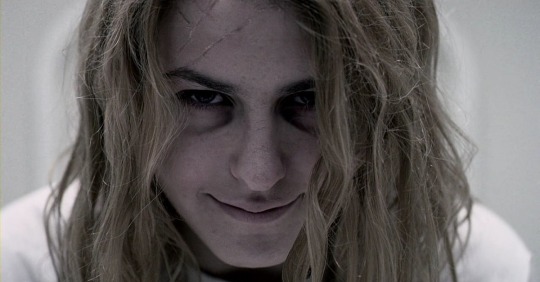
I’m not saying I think this was the best thing to do with HALLOWEEN 2. Personally, what I crave in horror movies is something that is farther beyond explanation than this--something that gesturally resembles my life experience, but that plunges past the veil of mundanity into a deeper, darker world of primordial fears and urges, addressing things that unsettle me because I cannot rationalize them. For me, horror is definitionally incomprehensible, and Rob Zombie’s HALLOWEEN diptych is fundamentally sane. But, I think what I’ve discovered is that these movies are not proper horror movies, in spite of their relentless sadistic violence. They are outlaw fables, with more DNA in common with something like EASY RIDER, than with FRIDAY THE 13TH. It’s funny to watch myself coming to a compassionate understanding of these movies that are themselves about outsiders and rejects who are specifically deprived of understanding. My goal in all this was not so much to convince people of the value of these movies, which one might reject on any number of reasonable counts, but to explain to myself why I keep coming back to them. It isn’t to condescendingly heckle them, and it isn’t just because they’re often handsome-looking, or because they’re so emotionally authentic even when the narrative is less than compelling. It must be because, even when I’ve found him challenging, I can’t help seeing Rob Zombie as a person with vision, someone who heroically eschews common consensus on taste and sense-making--the consensus even among horror fans and his own cinematic heroes--in order to say what makes sense to him personally. Finally, he has begun to make sense to me, too.
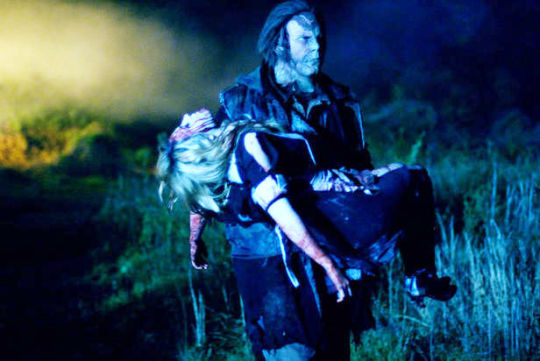
#rob zombie#halloween#2007#halloween ii#2009#blogtober#remake#John Carpenter#sheri moon zombie#michael myers#laurie strode#scout taylor-compton#brad dourif#malcolm mcdowell#tyler mane#the shape#horror#slasher#outlaw culture
147 notes
·
View notes
Text

easternspirit ha risposto al tuo post “Just one loving word to Kylo Ren’s fans and people who wanted...”
all i've got to say is that i believe in the progress of a human being & nowdays i find it hard to like people who always do the right thing bc i am fucked up myself & i wish i was a better person with all my soul but people need to understand that people who have done bad things can be good. idk about these movies. only saw 1 so i cant comment on that, i just don't like perfect people anymore. they don't exist.& its hard for victims of abuse to recover. nearly impossible
Yeah. Also cinnamon rolls are overwhelmingly boring as fuck most of the time. I mean, even from a merely narrative point of view... why should I give a shit for perfect people who never do anything wrong? Where’s the tension? Where’s the conflict?
And for sure. I also want to believe people can make mistakes and do bad things and not be bad people. Especially when they show that they want to be better, which always makes me root for them to get redeemed. Because wanting to be better is already a first step, and people should get chances to make it happen. Unfortunately American media is filled to the brim with Puritanical bullshit and Calvinism, so according to them (and increasingly so, just see cancel culture and all of that stupid shit) once you make 1 mistake you’re canceled and not given any chance. Which is a really cruel and fundamentally ignorant way to live. I mean ignorant about human nature. Also, it’s actively detrimental to society’s well-being. A person who made a mistake and gets abandoned will always be a bigger danger than someone who made a mistake and was helped in rehabilitating themselves. Compassion is key here, and unfortunately a lot of Americans don’t even know what the word means. I guess it only takes waiting for them to fuck up and be treated the way they want to treat others.
Anyway, yeah, I’ll always stan imperfect, complex character over cookie-cutter “good guys”. Which is why for example I never gave a shit for Disney “good guys” unless they at least went through trauma or some serious pain, made mistakes, suffered and got back up (like Simba). It’s why I don’t give a shit for Kristoff and I only care for Elsa and Anna, in Frozen. I mean, broadly speaking, one-dimensional good guys are boring as shit and unrelatable. That’s why a good rule of thumb for writers is to never write them. Because they’re not interesting, at all.
0 notes
Note
it's interesting reading your thoughts about The Americans because I've been binge watching the show with my cousins and as argentinians the whole anti-hero thing must feel pretty different than it is for a regular american. Like I'm the one constantly reminding them that it's a us show, and although it's well balanced, it's always gonna paint the us "side" in a better light. We tend to lose perspective because when you grow up learning about Che Guevara in our public schools,
the Jennings feel more like a Dr House kind of protagonist than a Walter White one. I remember when the Red Weding ep aired, and I having read the books was waiting for my friends and parent’s reactions, and their immediate thought was to relate it to Hiroshima and Nagasaki, like US-Lannister was an obvious connection to them, and it really tickled me knowing how all the americans were reacting online about it. Not trying to point morality fingers, just find it interesting how backgrounds matter
anyways love the show, such consistent writing is my kink, and season 3 of the americans is only on par with season 5 of the good wife for me, only thing I dare to ask is more Henry. Sorry to fill your inbox!
HAH. I do not watch GoT, but I can totally see how that would be amusing to witness through a cultural lens. Perspective matters! (as do critical thinking skills, but shhhh.)
So in terms of the anti-hero label, I don’t actually think anyone on this show is painted in a true heroic light. The show is pointedly critical of US politics pretty much at all times, in a way that feels increasingly relevant since Reagan was the one who got the ball rolling on much of the current neoconservative grossness that has taken over our political system. Like, Stan and his colleagues do plenty of morally dubious things too, and the show doesn’t shy away from that or frame it as being somehow better than anything the Soviets do. One of the things I loved most about Gregory’s storyline in S1 was that it played up the implicit racism within federal agencies and showed that it was a detriment to their success in a subversive way. (And man, do I miss Lucia from S2. The Russian element makes it hard to squeeze in a bigger focus on the sketchy shit the US has done in Latin America, but more please.)
This season it looks like they’re going to use the Jennings family to explore whether “American” values really exist or are that different from anyone else’s – we’ve already seen “I thought there were some things they wouldn’t do” re: the big mission of the first three episodes; we have a new character who escaped from Vietnam after his family was murdered in the US war; we have that fresh-off-the-boat Soviet family standing in juxtaposition to Phillip and Elizabeth on how they feel about the States and what it can offer; and we also have Paige grappling with the complexities of both her parents and her country and trying to untangle how those inform her identity.
(Also, a lot of Elizabeth & Phillip’s most effective morally grey moments have nothing to do with political ideology and everything to do with “is this an acceptable way to treat another human being who has never wronged me?” The answer is usually no.)
My read on this show is very different than that of my extended family who grew up during the Cold War – both because of disparate generational perspectives re: Russia as a threat, and because I’m an international relations nerd who spent several years living outside the US while global anti-americanism was on the rise and while also coding as arab to many white people. It was not a fun experience, but definitely valuable in terms of understanding intercultural conflict.
PLEASE SPAM MY INBOX AT ANY TIME. :)
13 notes
·
View notes
Audio
With the exponential rise of technology for the past decades, the reality of automation of labor has become increasingly real. Along with it, the progress of Artificial Intelligence (AI) has increased drastically in this age where computing and programming have central roles in the technological spotlight. It is not uncommon to already see cases of AI designs which aim to be autonomous, such as the idea of self-driving cars, who would ideally be able to choose the best situation given a dilemma where human lives are at stake. However, for all of our society’s advances in the field, the very fundamental question of how should we program AI still remains unanswered. Who should have such key responsibility, and what type of human qualities are we really looking to instill in AI? Should we aim for human qualities at all?
These are the ideas that inspire our group’s interest and fascination in the subject. Through the lense of social media, such as was the case of Microsoft’s disastrous AI “Tay”, our goal is to explore the implications of AI for the future of both media and society, and the accompanying responsibilities we have as a society during the rise of this future technology. We will deal primarily with three subjects which are the debate between open source AI development and privatized AI development, AI within the context of the gaze, and the AI context within ‘truth’ and subjectivity.
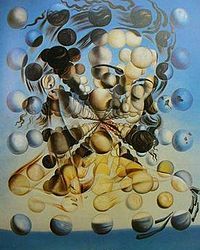
One of the features core to the analysis of media is the subjectivity of a work. Individuals often apply their own meaning to a work to make it more than it really is. Consider Salvador Dali’s “Galatea of the Spheres.” To some it is simply an image of a woman constructed from abstract spheres: an interesting visual, but nothing more. Yet, others will assign meaning to it as they realize its statement of a meld between science and religion, a marriage of the Virgin Mary and the atomic world. (Teixidor) However, it would seem strange for something as mathematically oriented as artificial intelligence to be assigned subjective meaning. After all, a painting such as Dali’s purposely has no complete truth. The truth is in the eye of the beholder, but such subjectivity could not be applied to an AI which only possesses one truth.
The very notion explained above outlines why the actions of AIs are subjective. People will perceive their outputs as truth, when in actuality, AIs do not create truth any more than an artist trying to represent her opinion on a canvas. In truth, AIs are only a manipulation of data, and are subject to the statistical techniques and data given to it. Yet, people will assign meaning to AIs when there is none there, and that meaning can go both ways: “On the one hand, people may trust automation even when it is not appropriate… On the other hand, people are not always willing to put sufficient trust in automation.” (Lee) Additionally with certain algorithms, further interpretation is needed. Take a clustering algorithm that, given a data set, will deduce various characteristics and group items based on those characteristics. It is then up to the human operator to subjectively determine what the groupings mean.
A more modern subject in the analysis of works of media is gaze. Gaze builds upon the subjectivity of media, but more specifically explores the perspective of the artist creating the work and what is assumed of the viewer. It was first coined in 1975 to discuss male gaze, but has since expanded to be used as a tool for all demographics. To use male gaze as an example, often times works of media - especially advertising - will portray women in sexualized positions, and for these examples, male gaze is employed as the audience and the creator are probably coming from a male perspective.
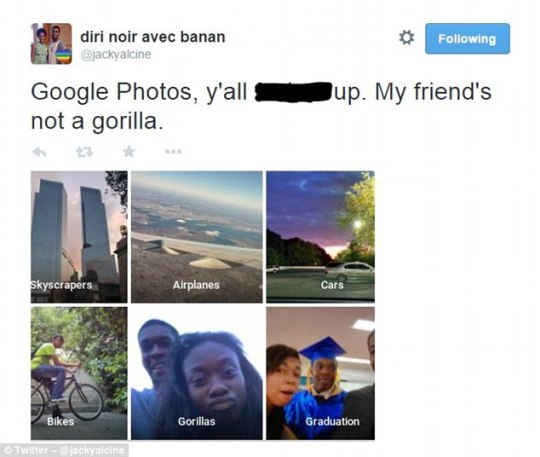
Artificial intelligence applies an interesting twist to the idea of the gaze. With the introduction of AI there is a third intelligent party added to the creator and the consumer. One may be able to assert that the AI has its own gaze or at least plays an intermediary role that contorts the original intention of the creator. There is no better example of this in action than a slip up by the object recognition algorithm on top of Google Images. This algorithm was designed to recognize the subject of an image and label them for easy search. But, the algorithm began recognizing people of African descent as gorillas. It turns out that the cause was an inadequate training set for humans which contained mostly people of European and Asian descent, which happens to be the major demographic of Google developers. As noted by Miroslav Kubat and Stan Matwin, “Adding majority examples to a training set can have a detrimental effect on the learner’s behaviour.” I’m sure that the engineers at Google did not intentionally want to cause this mislabeling, but, through AI their gaze was revealed.
In the limelight of artificial intelligence, I would like to discuss the cultural influence of the intelligent algorithms have on society. Although Theodor Adorno and Max Horkheimer’s message on the emerging crisis of cultural deception pertains to the era during World War Two, the substance that they discuss is still relevant to the matters of the world today, including ethics concerning the usage of machine learning in culture. In Alexander Markowetz’s paper “Psycho-informatics: big data shaping modern psychometrics,” he outlines the defined goals of a Big Data applications, which is “either attempt to (i) detect hitherto unknown trends and patterns, or (ii) ‘‘learn’’ new properties about known entities” (Markowetz 407). Using both techniques, researchers and companies can discern patterns in behaviour and people in general. While there are benefits to this wealth of knowledge, the ethical aspects of the Big Data must not be ignored as well.
In reference to the recent boom in psychometrics due to Cambridge Analytica (a software company that helped Ted Cruz and Donald Trump in the 2016 election), the usage of these private information to manipulate and distort public perception deserves a question of ethical approach. While software giants today mainly mine your digital footprint for recommendation systems of products and media, Cambridge Analytica uses their algorithms to “anticipate the needs of your customers and predict how their behavior will change over time, so you can build services, products and campaigns they really love." Using their personality profiles, the software company claims to tailor to needs of the consumer. All of these concerns are part of Adorno and Horkheimer’s message: that the cultural industry retains a monopoly through creating uniformity in culture.
Work Cited
Confessore, Nicholas, and Danny Hakim. "Data Firm Says ‘Secret Sauce’ Aided Trump; Many Scoff." The New York Times. The New York Times, 06 Mar. 2017. Web. 17 Apr. 2017.
Lee, John D., and Katrian A. See. "Sign In: Registered Users." Human Factors. Sage Journals, n.d. Web. 04 Apr. 2017.
Markowetz, Alexander, et al. "Psycho-informatics: big data shaping modern psychometrics." Medical hypotheses 82.4 (2014): 405-411.
http://sci2s.ugr.es/keel/pdf/algorithm/congreso/kubat97addressing.pdf
Teixidor, Montse Aguer (2009). Salvador Dalí - Liquid Desire. Melbourne, Victoria: National Gallery of Victoria. pp. 256–57. ISBN 978-0-7241-0307-2.
0 notes
Text
Opening Literary Paths for Learners
From a very young age, most of us are introduced to literature when we are exposed to picture books, short texts, and storytelling from the adults that surround us; providing us with the magical experience of looking into the world and other realities through the lenses of others. At school, children’s personal development, for example, their social skills, are taught through literature, and when learners get to high school their growth, knowledge, and thought are shaped as well becoming a prominent agent in the education process. This is the reason why what learners read should be carefully selected, not only considering the literary canons, but also other aspects such as their interests, and their context; in order to provide them with an appealing and meaningful literary experience that will allow them to take advantage of the important value literature has, the ability to comprehend and interpret reality and situations from many different perspectives.
According to Jordan Bates, “literary canons can be defined as the value determining lists of books that are ingrained in our educational system” (2003) in the Colombian context, two that can be highlighted are: One Hundred Years of Solitude written by Gabriel Garcia Marquez and Don Quixote written by Miguel de Cervantes Saavedra, everyone have had to read them while been at school. It would be obnoxious to say that literary canons are completely detrimental when they can help the reader identify their own literary taste, and it allows the reader to gain some cultural and reading background that might be useful further ahead in life. However, the problem lies when learners are not exposed to all types of literature, besides literary canons, because just as Bates mentions in his article readers become a canon dependent populace, and their critical thinking skills are damper instead of empowering. Literary canons may serve as a starting point alongside a wide range of strategies to empower the readers to go beyond words, analyze, question and judge everything that comes their way; nonetheless readers must break away from this path and start building their own with the encouragement of their professor, since this is what will help them with their development process and will help them find and built their own principles and life philosophies.
So, which other aspects should be considered when choosing what type of literature learners should be exposed to? Their interests and motivations should be one of the main factors to consider, since as Murat Hişmanoğlu mentions in the article “Teaching Through Literature” (2005), when a particular work is able to involve the reader to a personal level, by mirroring life situations they can relate to, the literary piece arouses the learner’s interest and it elicits strong positive reactions. It is a personal pleasure for the reader when he encounters his thoughts, feelings or situations he has gone through exemplified in a work of art, it becomes a treasure for him, something so appealing and meaningful that they enjoy what they are reading and their love for literature increase as well; instead of becoming an insufferable burden that is what happen when we are obliged to read something we don’t like, and with which we don’t relate to at all. Likewise, the article “How should one read a book” by Virginia Woolf emphasizes the importance of following our instincts when reading, and finding something that grabs our attention in order to build a healthy and powerful relationship with the book; likes are the most important thing, so that the reader can fully appreciate and delight themselves with this magical and complex art (2016).
Lastly, we have another aspect that must be considered when assessing the appropriate and enthralling literature for learners and it is the context. The context of the learner is the one that will help us determine the particular elements we need to consider to accomplish our goal, since not all the learning communities are the same; the context will give us then an insight on their needs, their likes, their language capabilities, their life experiences, their thoughts, their feelings and their cultural background. Murat Hişmanoğlu mentions in the article “Teaching Through Literature” (2005), It is much more probable that a literary text has a long-term and valuable effect upon the learner when it is chosen because it matches the readers’ life experiences, emotions or dreams. There is an incredible movie called “The freedom Writers Diary” that portraits this on a really complex social context and it is real based. This movie shows us an inexperienced teacher that is faced with a context she has never been exposed before, but through a selection of books that matches her students’ context, of people who had survived tyranny war and harsh situations, she was able to inspire them beyond the classroom and she changed their lives to their point where they feel move to write their own memoirs. This shows us the importance of knowing the learners since there is much more to them that what can be seen in a classroom and that shapes who they are, likewise that through literature life’s can be transformed and inspired.
To sum up, there are many aspects that must be carefully considered when selecting what learners should read and not only taking into account the literary canons or the bestsellers out there. Literature is a fantastic world full of opportunities and dimensions, there is something for each reading taste and a learner should never be deprived of discovering their own path, instead the educator should always center their efforts on opening literary paths for the learner till he finds his unique preference. Just as Ruxandra Viorela Stan says,
“The most important reason for using literature in the classroom is the personal development. It educates the reader, helps him form a set of values and form attitudes towards them. Literature can function as a change agent since good literature deals with some aspects of the human condition, and can thus contribute to the emotional development of the learner, and foster positive interpersonal attitudes. These values and attitudes will be used outside the classroom and as they read and understand the text, students are motivated and may foster a love of reading and literature.” (2014)
So, no one should be a judge for what they read, why? If the most important thing is that the reader enjoys it, and if he is doing so is because it is meaningful and appealing to him. And he is also learning through it since besides the themes of the book literature encourages four skills that are incredibly hard to harvest and become skilled at in life: empathy, tolerance for diversity, imagination and emotional intelligence.
References
Bates, J. (2013.) Literary canons exclude works no matter how selective canon makers are.The Daily Nebraskan. Retrieved from http://www.dailynebraskan.com/arts_and_entertainment/literary-canons-exclude-works-no-matter-how-selective-canon-makers/article_da83def2-ad43-11e2-b07a-0019bb30f31a.html
Gruwell, E. (n.d). The Freedom Writers Diary Summary. Enotes. Retrieved from https://www.enotes.com/topics/the-freedom-writers-diary
Hişmanoğlu, M. (2005). Teaching English Through Literature. Journal of Language and Linguistic Studies Vol.1, No.1. Stan V. R. (2014). The importance of literature in primary school pupils’ development and personal growth. Procedia - Social and Behavioral Sciences. Retrieved from www.sciencedirect.com
Woolf, V. (1925). How should one read a book?. Common reader: first edition. The University of Adelaide Library. retrieved from https://ebooks.adelaide.edu.au/w/woolf/virginia/w91c2/chapter22.html
S'7�E�
0 notes